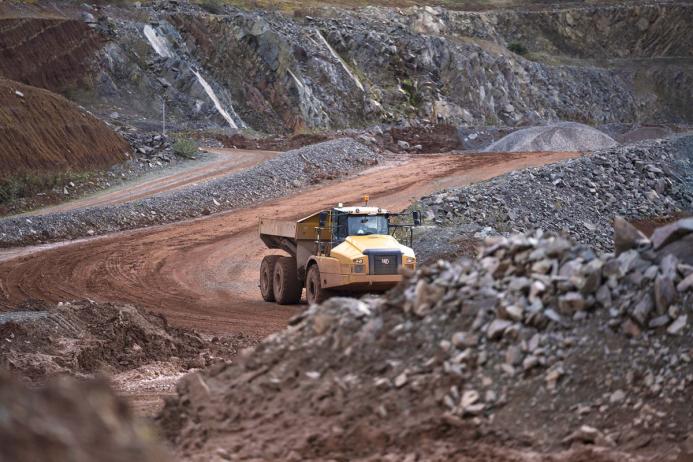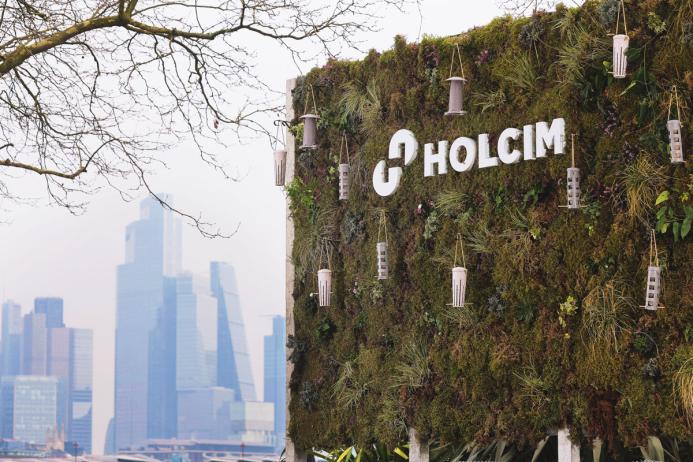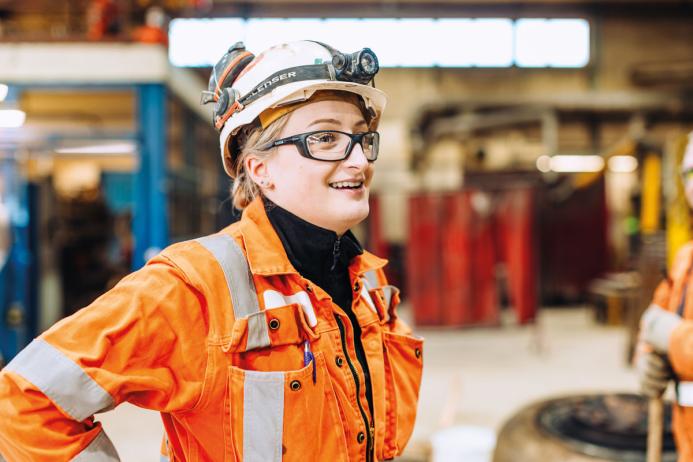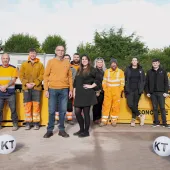Sense and Sustainability

First published in the July 2025 issue of Quarry Management
As the impact of climate change and the depletion of virgin aggregate sources becomes evident, the need to accelerate sustainability transformation has never been greater. From eliminating waste and pollution to increasing the use of recycled materials, many steps are required to make sustainable construction a reality. QM spoke to Kaziwe Kaulule, managing director of Holcim UK’s Aggregates and Construction Demolition Materials (CDM) divisions, about the company’s ambitious roadmap to net zero and its commitment to becoming a circular business
Sustainability and decarbonization in construction have been, and continue to be, hot topics in the UK – driven by the urgent need to address climate change, reduce carbon emissions, and enhance resource efficiency. As one of the most significant sectors affecting the environment, the broader construction industry must embrace sustainable practices to achieve a greener future.
With the Government committed to producing net-zero greenhouse gases by 2050, the UK quarrying sector’s role in safeguarding the planet has never been more prevalent, and shaping this major sustainable transformation will involve construction SMEs, heavy plant manufacturers, and leading building materials suppliers, including Holcim UK (formerly Aggregate Industries).
‘Sustainability is anchored in the foundation of our core values, and we have demonstrated an unwavering commitment to reducing our environmental footprint and incorporating sustainability measures into our long-term business strategies,’ said Kaziwe Kaulule, managing director of Holcim UK’s Aggregates business.
‘Reaching net-zero is the greatest challenge of our time, and as the construction industry is one of the largest consumers of natural resources and a significant contributor to waste and landfill, every segment of the mineral extractives sector must now change and adapt how it operates. As a proactive, forward-thinking, environmentally driven business, we have a pivotal role in helping the construction and infrastructure industry improve its sustainable working practices and environmental performance.’
Indeed, in line with this, Holcim UK recently launched their report ‘Making Sustainable Construction a Reality’, which identifies specific areas where the sector can concentrate its efforts to tackle the challenges. The publication aims to provide a roadmap for progress towards achieving sustainable construction by exploring decarbonization, the circular economy/waste reduction, smart construction, people and communities, and nature and biodiversity.
As one of Britain’s leading suppliers of sustainable materials and innovative building solutions to the construction sector, as well as a key player in the development of the country’s infrastructure, buildings, and homes, Holcim UK recognize the importance of looking beyond their own operations to further progress on other critical sustainability focus areas.

End-to-end sustainability
The future-focused building products heavyweight is under no illusion about the scale of the climate change challenge and the quarrying industry’s ambitious plan to achieve zero carbon emissions before 2050.
When discussing what drew him to the roles of managing director of Holcim UK’s Aggregates and CDM divisions and, previously, group strategy and commercial growth director, Mr Kaulule is quick to highlight that a key motivator for joining the business was the huge opportunity to collaborate with the wider industry in creating sustainable products and driving circularity throughout the entire value chain.
‘Decarbonizing our operations and the broader construction sector is central to our vision and strategy as a forward-thinking company,’ he said. ‘So, I am incredibly excited and honoured to be part of an organization that has always had one eye on the future, in terms of both growth and innovation.
‘The aim is to anchor environmental sustainability even more firmly in our operational business. This is the only way we can deliver lasting improvements, from reducing CO2 emissions and increasing the use of recycled materials in our operations, to embracing renewable energy solutions and scaling up the use of AI-driven autonomous technology in our day-to-day operational processes.’
Like many enjoying successful careers in quarrying, Mr Kaulule has worked his way up through various job roles to his current position at Holcim UK. Joining the global construction products sector in 2004, he has a proven track record of achieving operational excellence, supervising commercial and production teams, and executing sales, marketing, and retail strategies.
A Zambian national, Mr Kaulule has been appointed to key management roles for LafargeHolcim Group in France and a number of group senior marketing, commercial, and strategy posts across various Southern African countries.
One of his proudest professional achievements to date was, as CEO, leading Lafarge South Africa (now Afrimat) to unprecedented business success. Within 18 months, Mr Kaulule doubled the enterprise value of the company and delivered profitability, reversing a trajectory of more than five years of losses.
He has also spearheaded highly successful digital ventures in the UK and holds an MBA from the University of Oxford’s Saïd Business School, as well as a Bachelor of Commerce (Hons) and a Bachelor of Science from the University of Cape Town, bringing a unique blend of academic rigour and practical experience to his work.
It is safe to say that Mr Kaulule is a results-driven executive with a strong passion for commercial excellence, innovation, sustainability, and health and safety. His strategic vision, business acumen, and experience – which includes operational leadership of large-scale quarrying firms and organizational change – make him ideally positioned to tackle the constraints surrounding materials circularity and unlock the opportunities available.
‘Throughout my professional life, I have learned that effective outcomes are best achieved through collaboration, involving employees, colleagues, industry peers, and wider stakeholders supporting our sector,’ explained Mr Kaulule. ‘I am a great believer in having visible felt leadership and worker engagement across all levels of an organization. Maintaining an engaged, fulfilled, and healthy workforce directly enhances business performance, health and safety, and community relations.
‘As part of our long-term shift in how we manage and prioritize safety and well-being in the workplace, we have gone to great lengths to promote a respectful and inclusive workplace culture that instils our core values, fosters collaboration, and encourages accountability across the Holcim UK workforce.
‘Employees are undoubtedly a company’s most important asset, and I always encourage every colleague to leverage their unique talents each day – driving innovation, improving health and safety standards, and building a competitive advantage for our business to ensure we stay ahead of the curve and provide added value to our customers.’

Commercial refocus
Earlier this year, the blue-chip organization rebranded to Holcim UK as part of an ongoing drive for growth, innovation, and circularity across the business. Following 20 years as a UK-based subsidiary of Holcim Group, the new direction will see the company align more closely with its Swiss-based parent firm, which operates across 70 countries and employs more than 60,000 people worldwide.
‘Given the strength of the Holcim brand in the global construction products industry – and our natural progression in the UK aggregates sector – by uniting under one coherent brand, we can drive sustainable growth for our business and the strategic partnerships we have formed with many customers and suppliers over the years,’ said Mr Kaulule.
‘The decision to rebrand from Aggregate Industries to Holcim UK – rather than refresh – also represents our long-standing commitment to transform our industry and lead it towards a more sustainable future through innovation, continuous improvement, and collaboration.’
Alongside a target to accelerate green growth, Holcim UK are committed to expanding the uptake of sustainable building materials in the UK. Currently, a third of the company’s turnover comes from sustainable products, and it aims to continue increasing this share over the next five years.
Key to this will be circular product innovation through CDM, targeting an increase in use in products from 2 million tonnes per year to more than 6.5 million tonnes by 2030.
Holcim UK are already at the forefront of sustainable aggregate production and have demonstrated their clear commitment to making construction more circular with the launch of product ranges such as ECOPact low-carbon ready-mixed concrete, the ECOPlanet range of low-carbon cements, and the ECOCycle line of products, which are made from at least 10% recycled materials.
The company’s focus on circularity is underpinned by continued investment in innovations, solutions and sites across the UK, in addition to expertise from Holcim UK member businesses Land Recovery and OCL Regeneration. This has strengthened Holcim UK’s position in the CDM market and reinforced their ambition to be the British circularity market leader by 2030.
Founded in 1982 and based in Stoke-on-Trent, Land Recovery are a leading supplier of primary rail ballast, managing and treating spent ballast, and reprocessing a portion of it into new products for either the UK rail network or reintegrating it into the value chain to produce ready-mixed and precast concrete, as well as asphalt.
With four sites across the UK, London-based OCL Regeneration are specialists in the recycling of aggregates, bound materials and surfacing.
‘In a market that is more challenging and dynamic than ever, it is fundamental to understand what customers need and ensure we deliver innovative and environmental solutions that drive circular construction and fulfil our ambition to build new from the old,’ remarked Mr Kaulule. ‘Sustainability is a key market driver and growth lever for us. As part of our green agenda, I would like us to have 20% of our products made from recycled materials by 2030. We are currently at around 7%.
‘Reducing waste to landfill, promoting water reuse, preserving natural aggregate sources, and integrating more renewable energy generation throughout our operations are some of the key drivers of the circular economy. As a purpose-driven company, we must remain agile, be more client-centric, and adjust our offerings and services to meet customers’ needs to help them achieve real progress in sustainable construction.’
To further support their customers, Holcim UK will continue to emphasize knowledge sharing and best practices through their trusted partnerships. These include initiatives such as the Holcim Sustainable Construction Academy, which offers free CPD-certified courses on low-carbon, circular and regenerative design concepts, developed in collaboration with leading global academic institutions and architectural firms.

Shaping the future
Holcim UK are fully committed to achieving net-zero emissions throughout their supply chain by 2050. In 2023, the company launched a major net-zero strategy, which outlined how it would take action to reduce greenhouse gas (GHG) emissions in its operations and processes, accompanied by a set of measurable targets.
Mr Kaulule told QM: ‘Over the last year or so, we have been recognized and rewarded for the incredible, positive work we are doing to make our business and products more sustainable. Whilst we have made significant progress to date, there is still much to do to meet further targets and ambitions as we move into the next stage of our sustainability journey.’
Holcim UK have a clear understanding of the low-carbon technologies needed to achieve net zero, and the building products major has partnered with Swiss cleantech start-up neustark to develop a new carbon removal plant in London.
‘Demolished concrete is the world’s largest construction waste stream,’ said Mr Kaulue, ‘and our game-changing partnership with neustark has helped us take a huge step forward in our circular construction efforts with their cutting-edge carbon capture technology. By adopting this approach, we aim to increase the volume of recycled materials we use from 2 million to 3 million tonnes by the end of the year.’
The technology captures and stores biogenic CO2 in recycled concrete, preventing its release into the atmosphere and ensuring long-term storage, even with the reuse of materials. The process involves collecting CO2 from biomass sites, liquefying it, and injecting it into processed CDM for use in new concrete. On average, it stores 10kg of CO2 per tonne of demolished concrete.
Holcim UK’s investment in renewable energy is another important step towards reducing carbon emissions. The company has integrated more renewable energy generation across its UK sites, including major solar photovoltaic (PV) installations. Notable projects include Huland Ward and the company’s Bardon offices, which produce 415,000kWh and 73,500kWh per annum, respectively.
Holcim UK have also installed two 500kW wind turbines at two operating sites to supply low-carbon electricity. This includes Back Lane Quarry, near Carnforth, which saves around 700 tonnes of carbon emissions each year. The second site – at Melbur Blockworks in Cornwall – has allowed the business to reduce its imported electricity consumption by as much as 44%.
Like all business leaders, Mr Kaulule has strong ambitions to propel Holcim UK’s Aggregates division forward in the coming years and is excited about the growth opportunities that lie ahead.
Efficiency is a central lever in achieving sustainable construction, and in recent years, significant advancements have been made in artificial intelligence (AI) applications within the heavy building materials sector. As 2025 unfolds, Holcim UK say they are taking the lead in promoting AI and technology adoption.
‘One of the main benefits of AI technology is the increase in efficiency,’ said Mr Kaulule. ‘AI has the potential to transform the wider construction industry – improving safety, increasing productivity, and enhancing quality control. Our parent company Holcim are already scaling the use of AI-driven tools in manufacturing across more than 100 plants worldwide, boosting efficiency, and reinforcing capacity for our customers.’
One area of potential growth is the use of autonomous machinery. Earlier this year, Holcim UK participated in a trial utilizing AI-powered technology (supplied by Swiss start-up Gravis Robotics) to operate a 23-tonne Develon crawler excavator at their Lee Moor Quarry in Plymouth, Devon.
Once the autonomous solution was set up and testing had taken place, the machine was tasked with feeding the hopper of a screener with sand and gravel at a target performance rate of 100 cycles per hour. During two days of testing, the machine averaged 133 cycles per hour, shifting 1,500 tonnes of material daily with 99% accuracy and minimal spillage.
Following the successful trial, a three-way memorandum of understanding was agreed between Holcim, HD Hyundai XiteSolution (Develon), and Gravis Robotics at bauma 2025. The strategic partnership aims to develop the commercialization of autonomous technology designed to enhance productivity and improve safety in quarry operations and within confined material handling applications.
Attracting, developing, and retaining a skilled workforce is central to every successful business. At the same time, the widely reported skills shortage remains one of the construction sector’s most pressing challenges – an issue that Mr Kaulule is keenly focused on addressing.
‘There is an urgent need to attract the next generation of young people to become the future colleagues and leaders of Holcim UK,’ he commented. ‘Building responsibly and sustainably is only possible with a healthy pipeline of emerging talent that is fully plugged into the company’s sustainability mission and business model. Apprentices are a foundational aspect of this process, and companies that engage early with the future generation of quarrying professionals can gain a significant advantage.
‘Recruitment becomes more focused and efficient. We have a highly successful apprenticeship scheme in place, offering roles across all specialisms, including electrical engineering, project management, and materials laboratory technician. We also have an early outreach programme in primary schools and graduate development schemes to help build the construction workforce of the future.’
With a unified global brand, Holcim UK intend to lead from the front on megatrends such as decarbonization, energy efficiency and sustainable innovation, closing the loop on processes and promoting circularity at every stage of the construction lifecycle.
It is hardly surprising, therefore, that Mr Kaulule is excited about the prospects for Holcim UK. The business’s core values – which include safety, environmental sustainability, teamwork and collaboration, and a focus on people and communities – position it for long-term growth and establish the Holcim Group as the employer of choice for the best and brightest talent.
He concluded: ‘With the continued support and dedication of my great team, I am confident we will further develop our sustainable solutions offering and increase our profitability. These are very exciting times for us, and I look forward to underlining our status as one of the UK’s leading building materials suppliers at the forefront of driving transformative change across the construction industry.’
Subscribe to Quarry Management, the monthly journal for the mineral products industry, to read articles before they appear on Agg-Net.com








